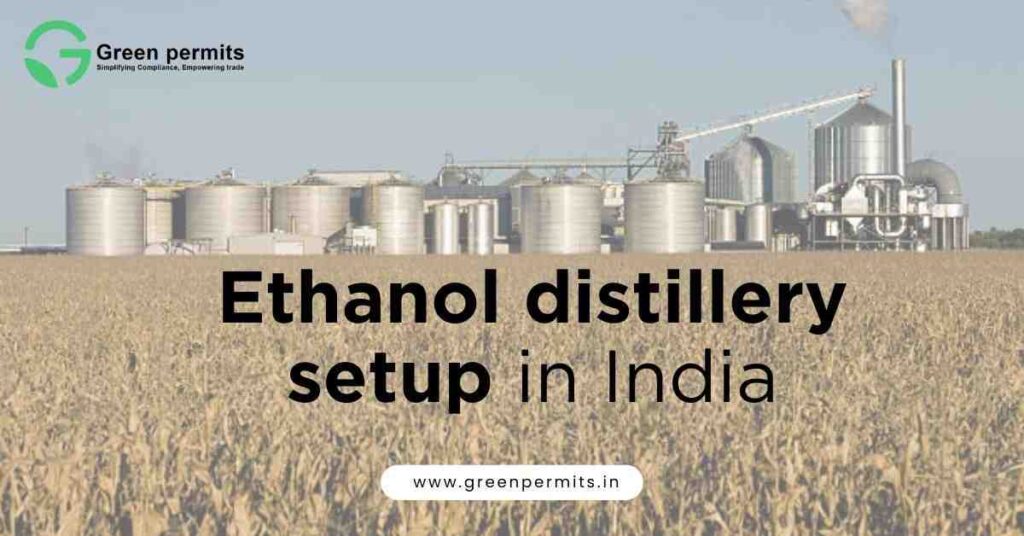India is at the cusp of a biofuel revolution. With the government targeting 20% ethanol blending in petrol by 2025, demand for ethanol has skyrocketed. In 2023, India produced over 600 crore litres of ethanol, marking a 45% jump from 2022. This surge has opened up opportunities for entrepreneurs, sugar mills, grain processors, and corporates to invest in ethanol distilleries.
Setting up an ethanol distillery, however, is not just about machinery and feedstock. It requires multiple licenses, approvals, compliance with CPCB/SPCB guidelines, and BIS quality certification. This guide explains the types of ethanol distilleries, licensing process, investment costs, subsidies, and a step-by-step checklist to get your ethanol project off the ground.
Takeaway: Ethanol distilleries are no longer niche projects—they’re now central to India’s clean energy roadmap.

Takeaway: Ethanol distilleries are not just profitable ventures; they align with India’s national energy security goals.
Derived from sugarcane by-products, these plants dominate India’s ethanol sector.
Use maize, rice, and other grains—an option especially promoted in regions with surplus grain production.
Leverage crop residues like rice husk, wheat straw, and bagasse. Supported by government grants for circular economy impact.
Mini Case Study: A sugar mill in Uttar Pradesh diversified into ethanol using molasses and now generates 20% of its annual revenue from ethanol supply to OMCs.
Takeaway: Choosing the right type of distillery depends on raw material availability and regional policies.
| Approval | Issuing Authority | Typical Timeline | Validity |
|---|---|---|---|
| Environmental Clearance (EC) | MoEFCC / SEIAA | 6–9 months | Project life |
| Consent to Establish (CTE) & Consent to Operate (CTO) | SPCB / CPCB | 3–6 months | 5 years |
| BIS Certification for Ethanol | Bureau of Indian Standards | 4–6 months | 2 years |
| Excise License | State Excise Department | 2–3 months | Annual renewal |
| Factory License & Fire NOC | Local Authorities | 2–4 months | 1–5 years |
Takeaway: Missing any of these approvals can delay project commissioning by 6–12 months.
DPR Completed – Detailed Project Report with feasibility, cost, and capacity.
Land Acquired – Industrial-zoned land with approved layout.
Environmental & SPCB Clearances – EC + Consent to Establish/Operate secured.
BIS Certification – Ethanol quality compliance registration done.
Machinery Installed – Fermentation, distillation & dehydration units operational.
Trial Run Clearance – Plant tested and approved for commercial production.
Takeaway: Following a structured checklist reduces project delays and compliance risks.
Comparison Table: Cost & Timelines
| Parameter | 2024 | 2025 (Revised Policies) |
|---|---|---|
| Capex for 100 KLPD Plant | ₹90–100 Cr | ₹70–90 Cr (with subsidies) |
| Average Setup Timeline | 18–24 months | 12–18 months |
| Govt Loan Interest | 8–9% | 5–6% (with subvention) |
Takeaway: Costs have dropped in 2025 due to improved financing and subsidies.
Takeaway: Subsidies can improve ROI by up to 25% for ethanol projects.
Takeaway: Strategic planning helps mitigate risks and maximize opportunities.
Takeaway: Ethanol is both a business opportunity and a national priority.
CTA:
👉 Planning your ethanol distillery in India?
📞 Call us: +91 7835006182
📧 Email: wecare@greenpermits.in
🌐 Visit: www.greenpermits.in
You need Environmental Clearance (MoEFCC/SEIAA), SPCB consents (CTE/CTO), BIS certification, Excise license, and local factory/fire approvals.
The cost is around ₹70–100 crore, depending on whether it is grain- or molasses-based.
Typically 18–24 months, though with 2025 policy support it can be reduced to 12–18 months.
GoI provides 6% interest subvention on loans; states offer tax exemptions, land rebates, and capital subsidies.
Yes, with approvals under MoEFCC, CPCB, and FDI policy, foreign investors can establish ethanol plants.